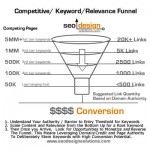Sounds like a harsh way to start off a blog post about SEO, but in actuality, if you are not promoting an internal page structure or preferred hierarchy from within your own website, content or links then why would you expect a search engine to treat your pages any differently than you do and rank those pages higher?
What constitutes a strong page in search engines?
- The quality of the content?
- The number of related pages on a topic?
- The number of internal links?
- The number of hops from the root and /or any other page?
- The relevance and / anchor text of inbound links?
- ALL OF THE ABOVE?
To summarize, the presence of quality signals to noise and the presence of on page prominence to off page promotion can translate into SERP momentum. In other words, pages capable of hurling themselves into a clearly dominant trajectory in the search engine result pages.
On a qualitative scale, considerations such as:
- Purpose – what is the purpose of the page? Is is a (1) rock-star (2) roadie or (3) undecided and supplemental?
- Site Architecture – Which is ideal? Flat, tiered and faceted, lean (landing page only), chunky (content rich and authoritative) or commercial and functional.
- Citation and Peer Review – Is there a clear champion amongst your page? Does each main landing page supported by a minimum of 10 solid internal or external links?
This list could be exhaustive; however the narrative is based on a very simple thread – results! If you do not (1) clarify which pages are important (2) feed them with contextual internal and external links to support the baseline keywords and key phrases that comprise those pages and (3) implement site architecture that supplements the strategy and tactic or your SEO approach, then you are sending a weak signal to search engines.
Also, playing off the statement above, if your purpose is to stand toe to toe against Wikipedia in an attempt to wrestle that spot from them, pick off a competitor who is ranking on fumes or challenge the 800 pound gorilla who dominates every keyword that remotely resembles a semantic variation or node of the parent keyword theme, then you will need a solid game plan.
Each tactic needs to be backed by two things – 1) a strong initial push and 2) signals of relevance to reinforce that push through either brute force link building or editorial finesse to cement the proper signals to help each page evolve.
You can approach SEO from one of two ways, the first is trying to reach a keyword if your relevance thresholds are below par and you have to build up enough content, links or authority to reach its relevance ceiling and the second is, you already have everything you need, but just need to focus it.
When trying to gain authority you have to follow the webs previously etched out metrics, play patty-cakes or leap-frog with competition to jockey for keyword positioning. However, after you cross the threshold and ARE the authority then simply by adding a keyword to a tag, a phrase to the title of a post, adding a new article or landing page and building a few internal links (from within the site) and / or attracting or building a few external links (from other sites) is all it takes to create the crux of relevance and reach the first page.
The Takeaway:
- Don’t leave rankings up to search engines, use a clear champion page by consolidating link-flow through selective contextual linking, a staggered deep link campaign (adding links over time) and using noindex, follow as a way to sculpt which pages are prominent to those pages that are the backup (behind the scenes) support team that sets the stage for the rock-star preferred landing pages.
- If your site architecture is sub-optimal, use 301 redirects to flatten pages out “by putting them in the root or removing unnecessary sub folders”, then create “exact match” SEO friendly URLs as well as canonicalize http:// or www. Preferences site wide.
- Ensure each page that is designed to rank in search engines is supported by no less than 10 contextual links from other related pages through primary, tiered or secondary navigation.
If you want to develop a genuine online presence, you will require (a) a road map based on keyword clusters known to have traction in the space (b) sufficient “link-worthy” content (c) patience and the management capacity to track, measure and react to competitive thresholds as needed to offset the barrier to entry based on pace required to establish authority online.
A few suggested posts for reading include:
- Tiered SEO Navigation and Link Structure
- Using 301 Redirects for SEO and More
- Duplicate Content and SEO
- SEO Tips for Website Templates
- SEO and Deep Linking
Once you set the stage, you have to follow up and keep chipping away until your website has enough trust, traction and authority to offset the tipping point for each keyword. After you reach that plateau, then the web should emulate your website and not the other way around.












Wow, a very great article. I agree with your requirements on having a genuine online presence. And also we need to make our identity online, credible and trustworthy. Do not let your integrity be tainted just because we want to earn more money. Earning more money should come because we are being true to our readers, clients and followers.
Jamie:
Glad you enjoyed the post and thanks for visiting…
Yes! If your website appear on top so it help to increase your business along with traffic in your site..Nice Post
Make good rapport with the other existing websites. Add their URL in your website and also tell them to use yours to increase the number of hit of the webpage of your website. This is again link building concept. Always make sure that links of your website are submitted to trusted and authorized site or directory like business.com, yahoo.com etc. This is one of the most considered SEO tips.